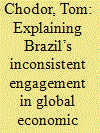| Srl | Item |
| 1 |
ID:
178854


|
|
|
|
|
| Summary/Abstract |
The growing significance of rising powers has led to debates about their role in global economic governance, with expectations they will either challenge its neoliberal agenda or become ‘responsible stakeholders’. However, the reality is that the role of rising powers is inconsistent: in some areas they accept the neoliberal consensus, while in others they contest it. This article utilises the State Transformation Approach to explain the inconsistent positions of Brazil: its support for free trade at the WTO, and its contestation of capital account liberalisation at the IMF, followed by a reversal and acceptance of it after 2014. The article argues this inconsistency can only be understood by analysing the domestic context of foreign policymaking, particularly the fragmentation of its state and the balance of forces in its political economy. In relation to trade, the fragmentation of the state enabled the agro-export sector to dominate formulation of policy. In finance, on the other hand, the greater autonomy of policymakers, and a balance of forces favouring intervention enabled the promotion of capital controls. However, this was a contingent outcome of socio-political struggles, and once the balance of forces shifted from 2014, financial forces reasserted themselves provoking a return to the orthodoxy.
|
|
|
|
|
|
|
|
|
|
|
|
|
|
|
|
| 2 |
ID:
152744


|
|
|
|
|
| Summary/Abstract |
This article analyzes the sources of gridlock in the Group of 20 since the global financial crisis. It engages with this question through Mark Beeson and Stephen Bell's framework, which identifies two processes of socialization operating concurrently within the G-20: hegemonic incorporation and collectivist cooperation. While hegemonic incorporation seeks to socialize the rising Southern powers into the US-led world order, their inclusion over time drives the G-20 toward more collective and cooperative forms of global governance. The article argues that the GFC has altered this equation in two ways: by accelerating the shift of economic power from the North to the South, and by undermining the hegemony of neoliberalism in the South. These two developments have made the United States less willing to offer the concessions necessary for hegemonic incorporation while, at the same time, bolstering the confidence of the Southern powers. Consequently, the article proposes that both hegemonic incorporation and collectivist cooperation are undermined, leading instead to gridlock and fragmentation. The article illustrates this argument through a case study of the gridlock surrounding the issue of global imbalances.
|
|
|
|
|
|
|
|
|
|
|
|
|
|
|
|